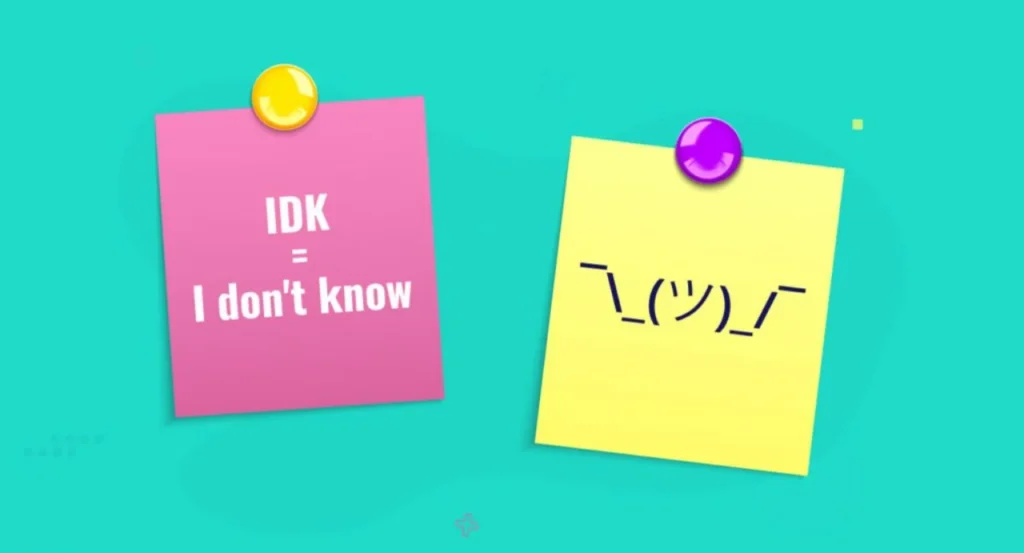IDK FULL FORM: Everything You Need to Know
Are you scratching your head trying to decipher the meaning behind the acronym “IDK”? Are you wondering what IDK stands for or how to use it? In this article, we will cover everything you need to know about IDK full form, meaning, usage, and more.
Read Other Full Forms
What is the Full Form of IDK?
IDK stands for “I don’t know”. It is an acronym that is commonly used in texting, messaging, and online conversations to express a lack of knowledge or information about something.
What Does IDK Mean?
As mentioned earlier, IDK stands for “I don’t know”. It is a shorthand way of saying that you are not sure about something or do not have the information required to answer a question.

IDK: Origin and History
The origins of IDK are not entirely clear, but it is believed to have originated in the early days of texting and online messaging. As more and more people began to use these platforms, they looked for ways to communicate quickly and efficiently. Acronyms like IDK, LOL, and OMG quickly became popular as a way of expressing emotions or conveying information without having to type out a full sentence.
IDK: Usage and Examples
IDK is typically used in response to a question or request for information. For example:
- Q: What time is the party tonight?
- A: Sorry, IDK.
- Q: Do you know who won the game last night?
- A: No, IDK.
- Q: Can you tell me where the nearest gas station is?
- A: IDK, I’m new to the area.
In these examples, the person responding is admitting that they do not have the information required to answer the question.
Alternatives to IDK
If you are looking for an alternative to IDK, there are several other acronyms you can use. Some of the most common alternatives include:
- I have no idea (IHNI)
- Not sure (NS)
- I don’t have the answer (IDHTA)
How to Use IDK in Texting and Online Messaging
If you want to use IDK in texting or online messaging, simply type the letter “IDK” in your message. You can use it as a standalone response or incorporate it into a sentence.
For example:
- Person 1: Hey, do you know what time the movie starts?
- Person 2: Sorry, IDK. I lost my ticket.
IDK: Dos and Don’ts
When using IDK in your messages, there are a few dos and don’ts to keep in mind. Here are some of the most important:
- DO use IDK when you genuinely do not have the information required to answer a question.
- DO be honest about your lack of knowledge.
- DO use IDK as a polite way to decline to answer a question.
- DON’T use IDK as an excuse to avoid answering a question.
Common Misconceptions About IDK
There are a few common misconceptions about IDK that are worth addressing. One of the most significant is that it is only used by young people. While it is true that IDK is more commonly used by teenagers and young adults, people of all ages and backgrounds use it to express a lack of knowledge or information.
Another misconception is that using IDK is a sign of ignorance or lack of intelligence. This is simply not true. Everyone has gaps in their knowledge, and using IDK is a simple and effective way to acknowledge that fact.
Benefits of Using IDK
Using IDK in your messages has several benefits. First and foremost, it is a quick and efficient way to convey a lack of knowledge or information. It can also be a polite way to decline to answer a question without offending the person asking.
Additionally, using IDK can help to build trust and credibility in your relationships. By being honest about what you do and do not know, you show that you are a trustworthy and reliable communicator.
IDK and the Future of Communication
As communication continues to evolve and become more digital, acronyms like IDK are likely to become even more prevalent. While some may lament the decline of traditional language skills, there is no denying that using acronyms like IDK is an efficient and effective way to communicate.
As such, it is likely that we will see the continued use of acronyms like IDK in the future of communication. Whether this is a positive or negative development remains to be seen.
Conclusion
In conclusion, IDK is an acronym that stands for “I don’t know”. It is a shorthand way of expressing a lack of knowledge or information and is commonly used in texting, messaging, and online conversations.
While some may view the use of acronyms like IDK as a sign of declining language skills, there is no denying that they are an efficient and effective way to communicate. By being honest about what we do and do not know, we can build trust and credibility in our relationships and communicate more effectively with those around us.
Frequently Asked Questions
Q.1 Is IDK only used by young people?
No, IDK is used by people of all ages and backgrounds.
Q.2 Is using IDK a sign of ignorance or lack of intelligence?
No, using IDK is a simple and effective way to acknowledge gaps in our knowledge.
Q.3 Can I use IDK as a polite way to decline to answer a question?
Yes, using IDK can be a polite way to decline to answer a question without offending the person asking.
Q.4 Are there alternatives to IDK?
Yes, some common alternatives include “I have no idea” (IHNI), “not sure” (NS), and “I don’t have the answer” (IDHTA).
Q.5 Will the use of acronyms like IDK continue to grow in the future?
It is likely that we will see the continued use of acronyms like IDK as communication continues to become more digital.

